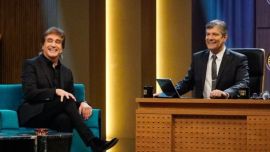Professor Mario Bunge, one of Argentina’s most esteemed eminences of philosophy, epistemology and exact sciences, has died at the age of 100, in the Canadian city of Montreal.
Local press reported the centenarian’s death as Tuesday, February 24, citing sources from the family.
Bunge, a renowned philosopher of science, dedicated his professional life to teaching. The author of more than 400 papers and 80 books, he was awarded at least 20 honorary doctorates and four honorary professorships.
He devoted himself to fighting pseudoscience, and said he always refused to accept truths that are not based on scientific evidence.
"It is easier to follow those who say that there is no truth, than to follow those who seek the truth," he said recently in an interview with the La Nación celebrating his centenary.
Addressing contemporary rejection of scientific thinking, he once said "that is seen due to the influence of [US] President[Donald] Trump, who apparently does not believe in the truth."
"Today we talk about post-truth and similar things. All this is protected by certain philosophers who are inspired by [Friedrich] Nietzsche and other Nazis and pre-Nazis like [Martin] Heidegger. But of course, they never sought the truth," he told La Nación.
However, he urged that we "not to be so pessimistic," saying that "most people live because they believe in the truth – they believe that bread is nutritious, they believe that vacations are necessary, they believe that there is social injustice."
A renowned scholar, among other distinctions Bunge received the Guggenheim Fellowship in 2009 and the Ludwig von Bertalanffy Prize in 2014.
In 1982, he received one of his most prestigious honours, Spain’s Prince of Asturias Award in Communication and Humanities. The Foundation said, in granting the award, that it was in “recognition of the work ... carried out by the philosophies of natural and social sciences, which have in Dr. Mario Augusto Bunge one of their most distinguished representatives.”
"Bunge has contributed to the analysis and foundation of theories in the field of Natural and Social Sciences with a long series of works which have been greatly influencing the research carried out in these matters both in Spain and in Latin America,” said the committee.
EARLY LIFE
Mario Augusto Bunge was born in Florida Oeste, Vicente López, in 1919, though he lived for more than 50 years in Canada, where he was a professor at McGill University.
He was of German stock, with relatives from the Basque country and Asturias region. A man of words, Bunge often said that he had received a humanist and philosophical education from reading the classics, as well as influential thinkers such as Hegel, Marx, Freud and Russell – though he would later distance himself critically from their work.
Bunge studied Physics and Mathematics at the National University of La Plata, earning a doctorate in 1952 in Physical Mathematical Sciences.
Motivated by the epistemological problems, he specialised in the fundamentals of physics and epistemology. In 1944, he co-founded the prestigious Argentine Physical Association yet saw his university career cut short for political reasons. When Perón fell, he was reinstated at the University of Buenos Aires and appointed Professor of Theoretical Physics and Philosophy of Science.
“At the time of the first Peronism, and for many years, I was a gorilla [anti-Peronist] because in the field of culture Peronism left nothing positive. On the contrary, it devastated with what little there was. But with the passage of time I understood that Peronism had some good aspects too,” he said in a 2010 interview.
Bunge broke into the field of science theory in 1959 with his work Causality: The Place of the Causal Principle in Modern Science, which was translated into seven languages, and in which he advocates for an expanded principle of determinism in modern science. Arguably his greatest work, in terms of academic impact, was Scientific Research, first published in 1967, which was translated into almost 20 languages.
He left Argentina in 1963 and passed through North American and German universities, finally settling in 1966 at McGill University in Montreal, Canada, where he holds the prestigious Frothingham Chair.
Bunge was also founder of the philosophy magazine Minerva (1944-1945) and co-founder of the Rioplatense Association of Logic and Scientific Philosophy (1956), as well as the prestigious Argentine Physical Association.
He is survived by his four children (Carlos, Mario, Eric and Silvia) and wife, Argentine mathematician Marta Cavallo, to whom he was married for more than 60 years.
– TIMES/PERFIL



















Comments